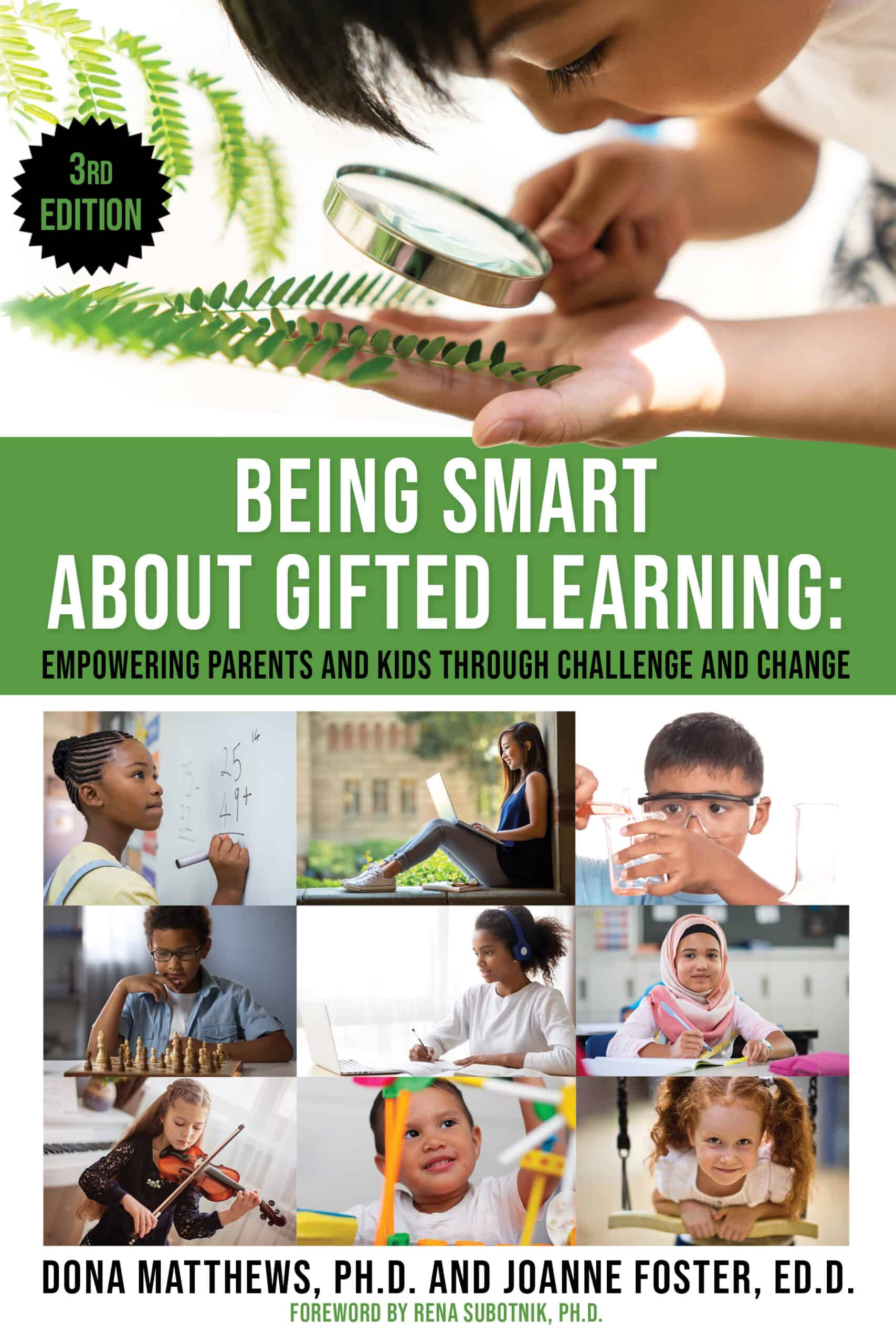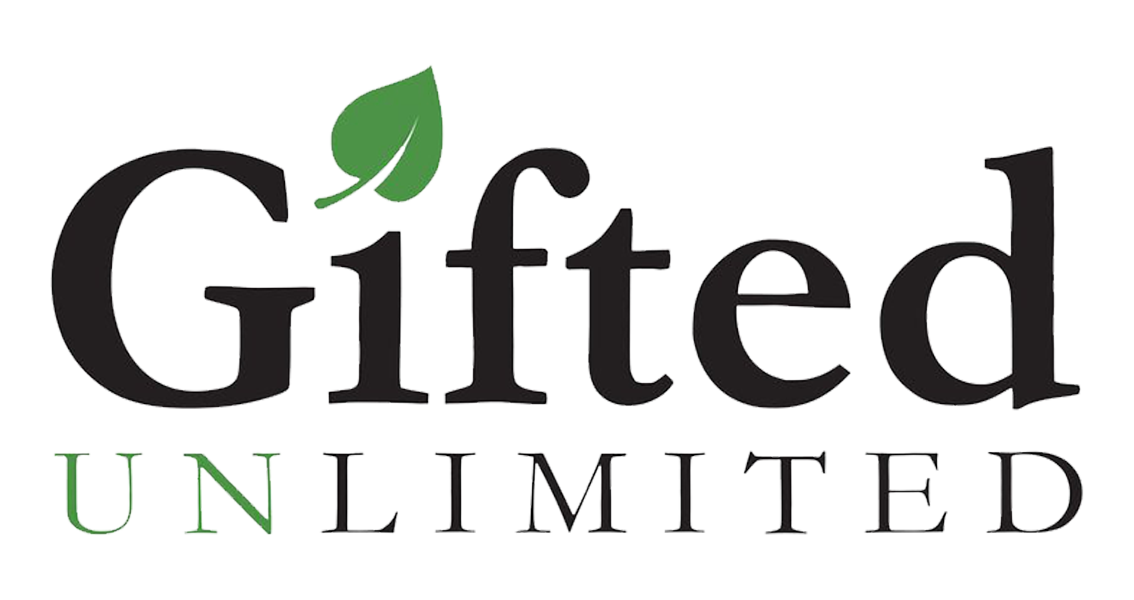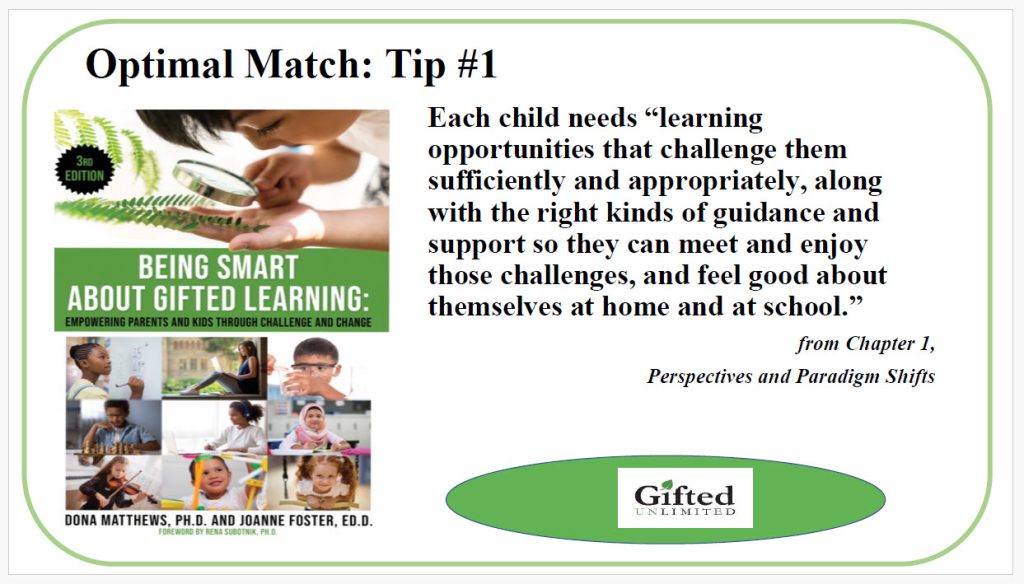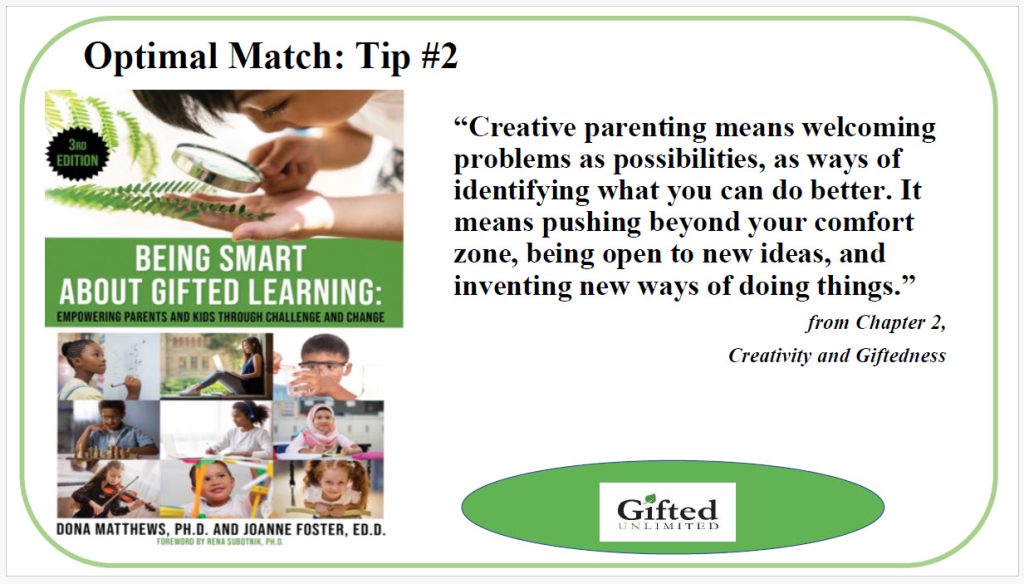Being Smart About Gifted Learning
3rd Edition
BY Dona Matthews, PH.D., and Joanne Foster, ED.D.
In Being Smart About Gifted Learning, Dr. Matthews and Dr. Foster reunite, combining areas of expertise and decades of professional experience, and sharing their knowledge about high-level development, and best practices in gifted education. They provide countess strategies for nurturing children’s and teen’s success—across domains, and when challenge and change occur. This essential guide informs parents and educators in myriad ways so they can effectively support kids’ learning trajectories, and address their individual needs.
Being Smart About Gifted Learning, 3rd Edition
By Dona Matthews, Ph.D. & Joanne Foster, Ed.D.
Published by: Gifted Unlimited
Empowering Parents and Kids Through Challenge and Change
Being Smart About Gifted Learning is the fully updated 3rd edition of Being Smart. The authors offer current perspectives on the field of gifted education, and on nurturing children’s and adolescents’ abilities. They discuss equity and diversity; creativity; assessments; motivation; homeschooling; multiple exceptionalities; neural plasticity; social-emotional issues; and more.
Dr. Dona Matthews and Dr. Joanne Foster address pressing questions and concerns, providing real-life examples and recommendations along the way.
This book is for parents, grandparents, teachers, professionals, and others who want to encourage children’s high-level development and provide the resources and learning opportunities they need to thrive at home, school, and elsewhere.
Also available as an eBook.
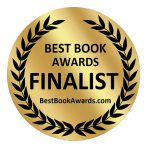
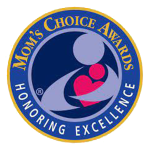
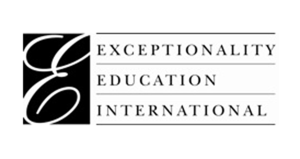
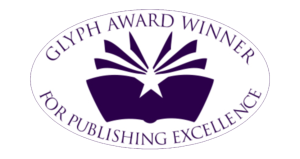
Reviews for Being Smart About Gifted Learning
“The premise of an education that is appropriate for the individual student is applicable to all students across the full range of achievement outcomes, although this premise is seldom applied to students classified as gifted and talented. Mathews and Foster highlight the importance of an appropriate education for gifted and talented students with the concept of an optimal match between students and their learning environments. The notion of optimal match is not only in keeping with the talent development approach, now the dominant paradigm in gifted education, but also the idea that giftedness is based on an interaction of person and context. The ideas in this book represent an important conceptual framing that will help gifted and talented programs serve broader and more diverse populations of students.”
Frank Worrell, Ph.D.
U C Berkeley, American Psychology Association President-Elect, 2022.
“This tremendous book describes how gifted education resources can be applied to nurturing talent broadly and inclusively across the population. The Optimal Match approach demystifies understandings of giftedness, and brings common sense to conceptions of meaningful learning at home, school, and elsewhere.”
Scott Barry Kaufman, Ph.D.
Columbia University
“Dona Matthews and Joanne Foster understand that each learner is unique. They discuss child development and education, paying attention to factors such as resilience, play, motivation, creativity, and supportive relationships. Being Smart about Gifted Learning is about finding and embracing opportunities to encourage children’s strengths, and nurture their well-being.”
Katie Hurley, LCSW
Psychotherapist
“Telra Institute illustrates Matthews & Foster’s Optimal Match in practice, recognizing that learning is fluid and requires ongoing re-evaluation and appropriate levels of challenge. Our differentiated, rigorous, and accelerated approach will benefit all advanced learners, while instilling in them the practices and values of curiosity, tenacity, initiative, and passion for learning.”
Michael Matthews, Ph.D., and Ronak Bhatt, Sc.D.
University of North Carolina and Telra Institute, Charlotte, NC
“By presenting exciting new work on mindsets, as well as recent research findings on expertise and cognitive neuroscience, these authors show the importance of habits of mind in cognitive development. This book will prompt re-examination of many long-held beliefs!”
Carol S. Dweck, Ph.D.
Stanford University
“Rich with examples, this book highlights the importance of an optimal match between challenging and engaging school and home experiences and opportunities to develop gifts and talents! A practical, thoughtful contribution by two leading experts!”
Sally M. Reis, Ph.D.
University of Connecticut
“Drs. Matthews and Foster have given us not only a comprehensive, intelligently designed and brilliantly crafted book but one written with extraordinary understanding and compassion. Readers of all kinds – parents, grandparents, teachers, counselors – will recognize that the authors have “been there” and will be grateful for how smart about gifted learning they have become from reading their work.”
Felice Kaufmann, Ph.D.
Psychologist and Creativity Expert
“This comprehensive, thorough and all-encompassing resource dives DEEPLY into deconstructing the multiple facets of what the term “gifted” or “advanced learner” can mean in such specific, reassuring, practical and helpful ways. It’s clear right from the introduction that understanding, nourishing and encouraging children’s unique sets of learning strengths and challenges is the key to accommodating them in their individual educational journeys.
Reading this book is a must for anyone who works with children whose focus is optimally developing their capabilities.
Seeing my music referenced in Being Smart About Gifted Learning as a developmentally enriching resource is an honour.”
Nancy Kopman
Composer, Children’s Music and Development
“Drawing on clinical research and real-life examples, and also addressing underrepresented populations, the authors deftly demonstrate how each gifted student is best supported through an individualized Optimal Match educational framework addressing the five “R’s” (being resourceful, reasonable, receptive, respectful, and responsive). And as we watch gifted classes increasingly being minimized and even eliminated, while aware that the pandemic itself has contributed to an already growing crisis in mental health, the authors provide us with powerful tools to help advocate for and outline opportunities to best support these students, even if such support comes outside traditional schools. This updated edition will be a welcome resource that should be in the hands of all parents and educators alike.”
Marianne Kuzujanakis, M.D., M.P.H.
Paediatrician and Child Advocate
“Mathews and Foster dive into the most common puzzles within gifted education using straightforward language, equally appropriate for family members and educators new to the field. They provide no-nonsense advice based on decades of research. Their Optimal Match approach cuts to the heart of what is essential for all gifted learners—having a curriculum that meets their needs on a variety of levels. This book addresses some of the critiques of gifted education in a rational, fair way grounded in psychology and pedagogy. The chapters on testing demystify the vocabulary and the process, the benefits and pitfalls, in a clear and concise way. The use of scenarios throughout the text enhances the layperson’s understanding of the nuances of giftedness and education of those who require a differentiated curriculum.”
Colleen Willard-Holt
Dean Faculty of Education, Wilfrid Laurier University
“Being Smart about Gifted Learning is a brilliant book that empowers and enlightens parents with essential information about optimizing their child’s educational, social, and emotional experiences. Drs. Matthews and Foster provide a plethora of tips and strategies that lead to a winning formula: helping children and teens discover the right combination of safety and challenge to support life-long resilience and creativity.”
Mona Delahooke, Ph.D.
Child Psychologist
“Drs. Matthews and Foster understand developmental processes, and appreciate how mind, body, heart, and spirit work in harmony to empower children and teens. This 3rd edition of Being Smart enlightens, and speaks clearly to the importance of family dynamics, engaging learning experiences, creativity, and core values. The authors provide guidance for nurturing well-being, motivation, and capacities across domains. I recommend this book highly!”
Marilyn Price-Mitchell, Ph.D.
Developmental Psychologist, Roots of Action
“Gifted individuals are neuro-unique learners. Being Smart About Gifted Learning is the new generation gifted education guide for parents, educators, policy makers, and anyone who desires a deep understanding into giftedness. Dona Matthews, Ph.D. and Joanne Foster, Ed.D. have created a compassionate and comprehensive resource by sharing their expertise in the field of gifted education and personal experience. This foundational book helps readers nurture exceptional thinkers to maximize learning using the Optimal Match approach.”
Nicole A. Tetreault, Ph.D.
Neuroscientist
BEING SMART ABOUT GIFTED LEARNING:
EMPOWERING PARENTS AND KIDS THROUGH CHALLENGE AND CHANGE
DONA MATTHEWS, PH.D. AND JOANNE FOSTER, ED.D.
Foreword By Rena Subtonik
Introduction
SECTION I: BEING SMART ABOUT GIFTEDNESS
- Chapter 1. Perspectives and Paradigm Shifts
- Chapter 2. Creativity and Giftedness
SECTION II: BEING SMART ABOUT DIAGNOSING MISMATCHES
- Chapter 3. Questions and Answers about Testing
- Chapter 4. Assessments and Tests
- Chapter 5: Mismatch Diagnostics: Labeling Learning Needs, Not People
SECTION III: BEING SMART ABOUT MEETING GIFTED LEARNING NEEDS
- Chapter 6: Differentiation: Meeting Gifted Learning Needs in the Regular Classroom
- Chapter 7: Other Options: Stretching the Boundaries
SECTION IV: BEING SMART ABOUT GIFTED DEVELOPMENT
- Chapter 8. Motivation and Achievement
- Chapter 9: Social, Emotional, and Behavioral Considerations
- Chapter 10: How Does Giftedness Develop? (And What Role Do Parents Play?)
SECTION V: BEING SMART ABOUT CHANGING REALITIES IN GIFTED EDUCATION
- Chapter 11: Parents and Teachers: Supporting Children’s Gifted Learning Together
- Chapter 12: Optimal Learning for All Children
Endnotes
References
Index
About the Authors
Ignite Your Ideas – Back Cover
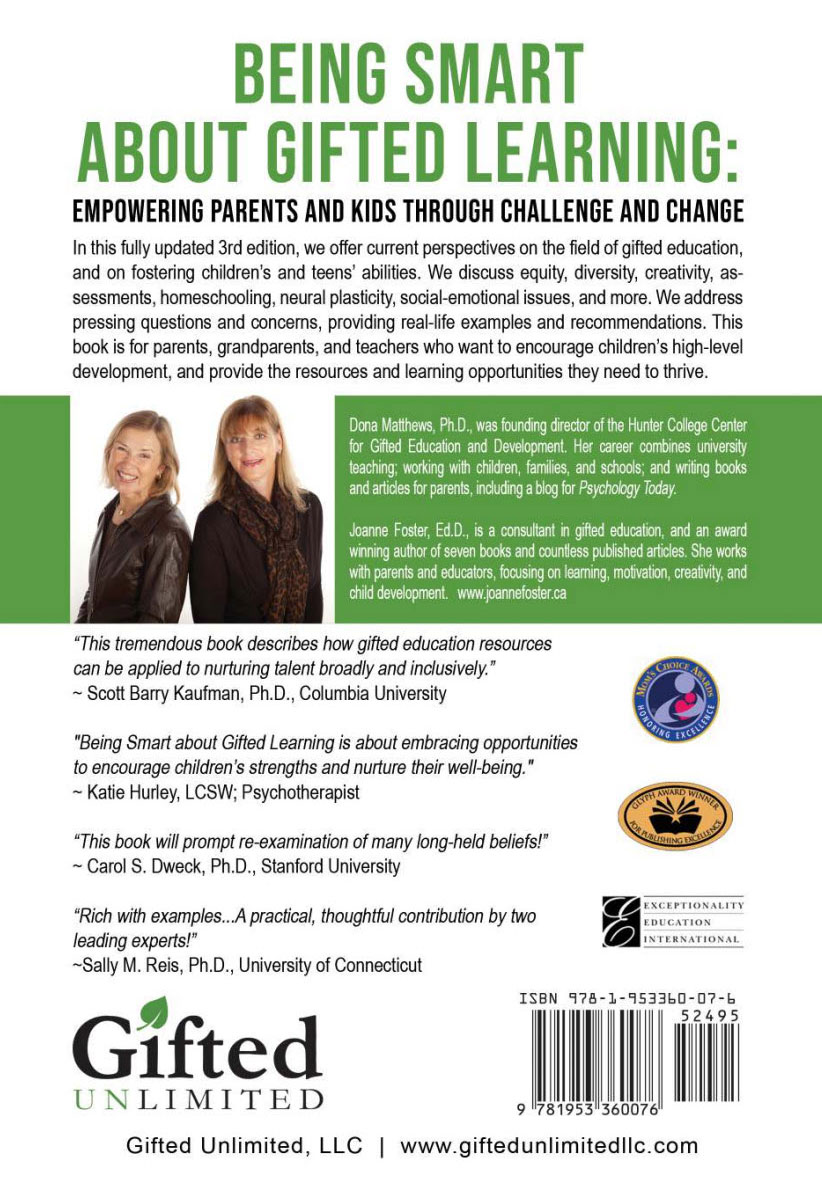
Book Club Ideas for
Being Smart about Gifted Learning:
Empowering Parents and Kids Through Challenge and Change
by Dona Matthews & Joanne Foster
Consider these excerpts from Being Smart about Gifted Learning. How do you see them applying in your own family?
1. Each child needs “learning opportunities that challenge them sufficiently and appropriately, along with the right kinds of guidance and support, so they can meet and enjoy those challenges, and feel good about themselves at home and at school.” From Chapter 1, “Perspectives and Paradigm Shifts”
2. “Creative parenting means welcoming problems as possibilities, as ways of identifying what you can do better. It means pushing beyond your comfort zone, being open to new ideas, and inventing new ways of doing things.” From Chapter 2, “Creativity and Giftedness”
3. “The only good reason to test gifted learning needs is to figure out how to better meet those needs, putting the focus on diagnosing possible mismatches, rather than on categorizing children as gifted (and not).” From Chapter 3, “Questions and Answers About Testing”
4. “Rather than seeing IQ as a true measure of a person’s intelligence, it’s more accurate to see it as describing an individual’s functioning at a certain time on a certain number of specific tasks.” From Chapter 4, “Assessments and Tests”
5. “As much as possible, the Optimal Match approach avoids categorizing some children as gifted (and some therefore as not gifted), and instead focuses on identifying individual children’s subject-specific gifted learning needs.” From Chapter 5, “Mismatch Diagnostics: Labeling Learning Needs, Not People”
6. “Every child wants to learn. They yearn to be engaged and to have their time in school feel useful and relevant. Those who arrive already knowing big chunks of the curriculum won’t be doing much learning without some kind of change to what’s normally taught, or how it’s taught.” From Chapter 6, “Meeting Gifted Learning Needs in the Regular Classroom”
7. “A range of options that can nurture high-level development…can be made available in regular classrooms. The objective is to find a good match between the learning needs of your child, and the range of learning opportunities that are available, thinking as broadly as possible.” From Chapter 7, “Other Options: Stretching the Boundaries”
8. “Recent research points to three recommendations for motivating continued engagement in learning: 1.) Match tasks to each child’s ability and interests; 2.) Support students’ autonomy; and 3.) Create an environment that’s warm, welcoming, inclusive, and accepting.” From Chapter 8, “Motivation and Achievement”
9. “By providing a dependable environment, and modeling effective coping skills and good problem-solving attitudes, you can go a long way toward helping your child respond effectively to adversity and acquire the emotional resilience they’ll need for making the most of their abilities.” From Chapter 9, “Social, Emotional, and Behavioral Considerations”
10. “A person’s intelligence is a result of early nurturing experiences, the surrounding cultural milieu, educational paths and circumstances, life events, and other factors, all interwoven with inherited genetic patterns, and organized by the individual as an active agent in creating their own intelligence.” From Chapter 10, “How Does Giftedness Develop? (And What Role Do Parents Play?”
11. “Successful advocacy can be thought of as a problem-finding and problem-solving process…Gifted advocacy occurs on various levels, from individual parents working toward more appropriate programming for their own child, to a concerned group improving the way an entire district deals with gifted education.” From Chapter 11, “Parents and Teachers: Supporting Children’s Gifted Learning Together
12. “We hope you’ll continue being smart about gifted learning, open to the wealth of opportunities available for encouraging and supporting gifted-level development in those children and adolescents with whom you work, live, and share the richness of life.” From Chapter 12, “Optimal Learning for All Children”
Alternatively,
Consider these recommendations for supporting gifted learning. (They appear on pp. 294-295 of Being Smart about Gifted Learning.) How are you already implementing them, or choosing to do something different?
- Create an environment of predictable stability and support.
- Provide a variety of age-appropriate play materials, thinking about as many domains of development as possible (including physical, musical, social, mathematical, linguistic, and visual/ spatial).
- Play with your child.
- Encourage them to have an attitude of playful exploration. Model that attitude yourself.
- Listen to your child.
- Respond enthusiastically to your child’s interests.
- Respect your child’s personhood, including their feelings and opinions.
- Provide opportunities for them to learn what they can do, letting them stumble and fail, within reason.
- Help them think about what they want to do next.
- Offer guidance, support, and encouragement as needed.
- Help your child set reachable goals.
- Help them learn to take setbacks in stride, asking what they can do differently next time.
For ideas on organizing a book club, click here.
Child development professionals Matthews and Foster expound on gifted education in this third, revised edition of their guide for parents.
Early in the first section of this work, the authors assert that the term gifted is frequently misunderstood to mean that a child is “born with the ability to learn everything.” Instead, Matthews and Foster believe in the concept of an “Optimal Match,” in which educational opportunities match up with a child’s “current level in a given subject area.” They explore this notion in detail in subsequent sections, which note how a child may have above-average aptitude in some areas and not others. Section II directly addresses how to diagnose “mismatches,” with several insightful and useful chapters highlighting the differences between standardized tests, which, by design, “cannot reflect the authentic, interactive, and dynamic nature of learning,” and assessments, which include “observation, listening, [and] dialogue.” In this section, the authors point out that children shouldn’t be labeled as gifted themselves; rather, their “gifted learning needs” should be identified and addressed. Especially pertinent are examples of conversations between parents and children about the implications of being labeled gifted.
The clear emphasis in the third section is on how to meet children’s educational needs; here, the authors offer specific, practical suggestions for teachers to use in classrooms as well as clearly explained alternative options, such as home-schooling. In Section IV, Matthews and Foster turn their attention to such topics as motivation, achievement, social and behavioral considerations, and the roles that parents play in developing children’s abilities. Section V effectively puts all the previous sections into a real-world context; for example, the authors discuss how parents and teachers can work together and the reasons why parents need to be advocates for their children. Throughout the book, Matthews and Foster usefully cite numerous sources, including new research published since the last edition, and offer relevant anecdotes to validate their arguments.
An authoritative, up-to-date, and comprehensive manual!
What is the target audience for this book?
Being Smart, 3rd Edition is well-suited for parents, teachers, psychologists, and other professionals who are interested in children’s learning and well-being, The book is comprehensive AND reader-friendly, with material that’s applicable for those who live and/or work with children from cradle to college.
What is the main focus of this book?
The focus is on finding an “Optimal Match” for children and teens so that they can maximize their learning opportunities, and engage in meaningful educational experiences at school, home, or wherever they might be. Being Smart about Gifted Learning is a fully updated version of the authors’ previous two Being Smart books, and there’s plentiful information about giftedness; creativity; tests and assessments; programming options; motivation; social-emotional issues; developmental pathways; navigating challenge and change; advocacy; and more. Check out the Being Smart “Table of Contents” tab on this website.
How many pages are there in this book?
There are 460 pages in Being Smart about Gifted Learning.
Why is Dr. Foster qualified to have written this book?
Dona Matthews, Ph.D., and Joanne Foster Ed. D., co-authored all three editions of Being Smart. They’ve both been involved in gifted education for several decades, having taught Gifted Education at the Ontario Institute for Studies in Education of the University of Toronto, and being active in many local, national, and international gifted initiatives. Dr. Matthews is an accomplished psychoeducational consultant; Dr. Foster’s doctoral research was (and much of it continues to be) gifted-oriented, and she designed and taught gifted programs for many years. Both authors are gifted education consultants, community liaisons, advocates, and keynote presenters on a broad range of topics relating to gifted/high-level development.
What supplementary resources can readers find within this book?
There are many highlighted segments that feature accounts of people’s real-life challenges and triumphs, and there are targeted point-form “strategies lists” across all the chapters. There are also hundreds of endnotes, pp. 403 – 425, and hundreds of references (pp. 427 – 457).
What kinds of reviews has this book received?
The Kirkus Review describes this book is “an authoritative, up-to-date- and comprehensive manual.” There are many terrific reviews, with comments such as “tremendous book,” and “practical, thoughtful contribution by two leading experts,” and “a through and all-encompassing resource.” Other comments include “comprehensive, intelligently designed and brilliantly crafted,” and “a welcome resource that should be in the hands of all parents and educators.” Being Smart garnered several awards when it was first published, and the new version has even more key topics, resources, and up-to-date material. Check out the “Reviews” tab on the Being Smart page.
Are there any illustrations or charts in this book?
On pp. 108 – 110 there’s a chart with a synopsis of assessment tools There are no illustrations.
How can I see samples of the content of this book?
There is an “Excerpts” tab on the Being Smart book page on this website.
Is there a book club guide or other online material that supplements this book?
Yes! There is a complementary downloadable Being Smart about Gifted Learning Book Guide. Designed for parent groups, book clubs, professionals, and readers who belong to organizations interested in educational practices and child development, this resource booklet contains information about the book and chapter by chapter considerations. It can be ordered for FREE at the bookshop on the publisher’s website here. Additional material for discussion and reflection—relating to excerpts from the book, and to recommendations for supporting gifted learning—is available by clicking on the “Book Club” tab on the Being Smart book page on this website.
Related Blog Posts
Helping Kids Gain Voice and Vigor
Empower youth to shape a better world by nurturing their character, creativity, and leadership. Adults play a crucial role in guiding young minds towards impactful actions and positive global contributions.
Optimal Learning – Suggestions for Parents
Dr. Joanne Foster’s article focuses on preparing parents for evolving educational landscapes. It advocates for awareness and adaptability, suggesting active involvement in school communities and informed decision-making. It also encourages maintaining a positive outlook to support children’s optimal learning.
Orchids, Children, and Optimal Growth
Dr. Joanne Foster discusses nurturing children’s growth, comparing it to caring for an orchid. She emphasizes the importance of a strong foundation and support for optimal learning, addressing the fluid nature of development and the uniqueness of each child’s growth trajectory.





